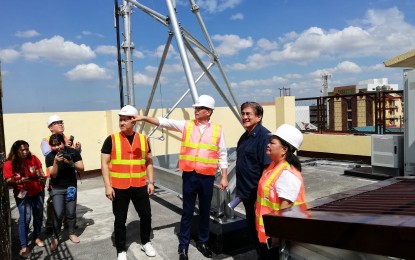
SITE INSPECTION. Department of Information and Communications Technology (DICT) Secretary Gregorio “Gringo” Honasan II (2nd from right), DITO chief technology officer Rodolfo “Boy” Santiago (3rd from right), and DITO chief administrative officer Adel Tamano (4th from right) during a site inspection of one of DITO's cell towers in Quezon City on Wednesday (February 26). Honasan said the release of the common tower policy, previously announced to be issued back in January, will be released in March--has been delayed to ensure the inclusion of all stakeholders and due to some "explainable" issues. (Photo by Raymond Carl Dela Cruz)
MANILA – The common tower policy, which would allow multiple telecommunications (telco) networks to use the same towers resulting in faster rollout and cheaper services, would be released next month, Department of Information and Communications Technology (DICT) Secretary Gregorio Honasan II said on Wednesday.
In an interview during a site inspection of one of the cell towers in Quezon City of DITO Telecommunity, a third telco player, Honasan said the policy is now on its final draft and will be released in the coming weeks.
“We want to make sure that everybody is heard. Marinig natin lahat ng (We will hear all the) players. Basta sabi namin, ang iwawagayway natin ay (We told them, let's wave the) yung Philippine flag, hindi yung (not the) balance sheets, and income statements,” Honasan said.
DICT Undersecretary Eliseo Rio Jr. earlier announced that the common tower policy would be released in January.
However, it was then again pushed to March to ensure that telco companies were included in its drafting and that the policy is “thorough, comprehensive, and be guided by what the data tells us,” Honasan said.
He said bureaucratic problems contributed to the delay in its release, as well as some technical problems such as inconsistent baseline data submitted by the stakeholders in the country’s telco industry.
“In fact, we have problems with data management--yung baseline data natin kanya-kanya (our baseline data has been free for all). The delays are explainable in short,” Honasan said.
Once released, he said the policy aims to put up a total of 50,000 common towers across the country.
No effect on DITO
DITO chief administrative officer Adel Tamano said the company has worked around the delays in the rollout of the common tower policy.
“The approach that we have taken is that even without this common tower policy, we are going to deal with tower companies who are ready to build,” Tamano said in an interview.
He said the towers to be used by DITO are already being built with tower-sharing in mind.
“The contracts that we've given will allow them to build the towers and we are their first tenants. So, we are taking the risk because it's more expensive when you are a lone tenant,” Tamano said.
DITO chief technology officer Rodolfo “Boy” Santiago said in the past week, DITO has completed issuing contracts with three local tower companies, one of which will build almost 300 towers for tower-sharing.
Earlier, Tamano said the company’s technical rollout this July will also not be affected by the current outbreak of Covid-19 in China, saying the company’s vendors will prioritize DITO due to the strict timeline of its rollout.
He added while the company may invoke “force majeure”—or citing unforeseeable forces that prevent the fulfillment of its contract, specifically due to the Covid-19 epidemic—the company has decided instead to find ways to mitigate its effects so that the company’s rollout will not be delayed. (PNA)
